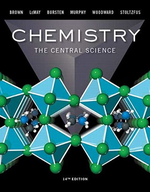?Imagine that you are climbing a mountain. (a) Is the distance you travel to the top a
Chapter 5, Problem 5.5(choose chapter or problem)
Imagine that you are climbing a mountain.
(a) Is the distance you travel to the top a state function?
(b) Is the change in elevation between your base camp and the peak a state function? [Section 5.2]
Unfortunately, we don't have that question answered yet. But you can get it answered in just 5 hours by Logging in or Becoming a subscriber.
Becoming a subscriber
Or look for another answer
